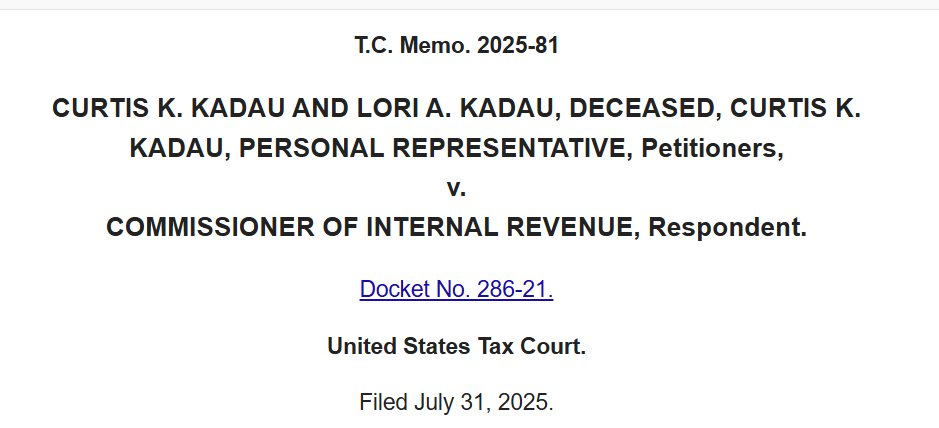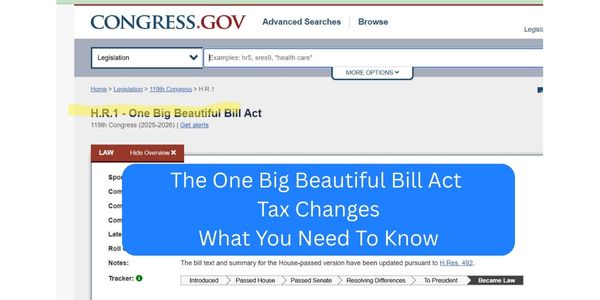Why Fee-Only is an MQFP® Standard: Lessons from the Tax Court

When military and veteran families seek financial guidance, they deserve advice that is clear, objective, and free of hidden agendas. That’s why the MQFP® (Military Qualified Financial Planner) designation requires all credentialed professionals to be fee-only. It’s not a marketing slogan—it’s a standard grounded in both common sense and confirmed in real-world legal rulings.
A recent U.S. Tax Court case, Kadau v. Commissioner (T.C. Memo. 2025-81), underscores exactly why this requirement is so critical. In that case, the Court disallowed a taxpayer’s deductions and upheld penalties imposed by the IRS because the only professional advice they relied upon came from the promoter of the very product that got them into trouble in the first place. The Court’s reasoning is straightforward: you cannot rely on “advice” from someone who profits when you follow it.
That’s the same principle behind our fee-only commitment. Let’s unpack what the case shows, why it matters for military and veteran families, and how MQFP® Professionals protect clients from the hidden conflicts that can derail their financial well-being.
The Case: Kadau v. Commissioner (T.C. Memo. 2025-81)
Curtis and Lori Kadau were taxpayers who became involved in what’s known as a microcaptive insurance arrangement. These products are often marketed as creative ways to reduce taxes while setting aside funds for future risks. The problem is that many of these arrangements cross the line from legitimate insurance into illegal tax shelters.
In the Kadau case, the Court found:
- The arrangement did not constitute bona fide insurance for federal tax purposes.
- Premium deductions taken by the taxpayers were disallowed.
- Accuracy-related penalties under Internal Revenue Code §6662 were imposed.
But perhaps the most important point for our purposes is this: the taxpayers argued they should not be subject to the accuracy-related penalties because they had relied on advice from professionals. This is a legitimate argument. The Tax Court recognizes that the tax code is complex, and if taxpayers reasonably rely on advice from competent professionals they should not be assessed additional penalties for filing an incorrect tax return if those professionals are mistaken. Unfortunately for the Kadaus, the Court rejected that defense in their case because the professionals they relied upon were the promoters of the microcaptive insurance arrangement, financially benefiting from its sale.
The Court reaffirmed a long-standing principle:
Reliance on advice from the promoter of a product is not reasonable. This Judge even went a bit farther stating, “advice hardly qualifies as disinterested or objective if it comes from parties who actively promote or implement the transactions in question”.
We couldn’t have said it better ourselves!
Why This Matters Beyond Taxes
At first glance, Kadau might look like “just another tax shelter case.” But its lessons are much broader. It’s about the integrity of advice.
Think about it: If someone stands to make money when you follow their recommendation, how can you be sure their guidance is truly in your best interest? As the Tax Court said plainly, you can’t.
That’s exactly the concern the MQFP® Certification Program addresses in the realm of finding a trusted financial guide. Families, especially military and veteran families juggling frequent moves, deployments, and complex benefits, need advice that’s clean, transparent, and trustworthy. They don’t need to wonder whether the financial professional across the table is recommending a product because it’s the best fit, or because it pays the highest commission.
The Fee-Only Standard: What It Means
So what does “fee-only” actually mean? For MQFP® Professionals, it means:
- No Commissions. MQFP®s do not accept commissions from product sales—whether that’s insurance policies, mutual funds, annuities, or any other financial product.
- No Kickbacks. MQFP®s don’t get “referral fees,” revenue-sharing, or other indirect compensation from recommending specific products or services.
- Transparent Compensation. Clients know exactly how their MQFP® Professional is paid—whether that’s a flat fee, hourly rate, or percentage of assets under management.
The fee-only model removes the financial incentives that distort advice. It’s the cleanest way to ensure that when a financial professional recommends a course of action, it’s because it serves the client’s goals not the advisor’s bottom line. When your MQFP® Professional is being paid by you and only you, there is no confusion or conflict about who they work for.
Why Military and Veteran Families Are Especially Vulnerable
Military families are no strangers to high-pressure sales tactics. For decades the only financial firms who would serve military families were pitching unnecessary insurance and expensive investment products. They could get away with this because they weren’t required to be fiduciaries and the fee-only model for financial guidance was not as easy to implement as it is today.
Those days are not completely behind us, but they are on their way out. New industry trends are emerging, in part because the internet has increased the spread of good personal finance information. (There’s bad stuff out there, too, so be wary!)
Things are improving, but here’s why military and veteran families are still at risk:
- Frequent relocations make them targets for sales pitches in each new location.
- Deployment stress creates openings for “quick fix” solutions that promise security.
- Complex pay and benefits (housing allowance, combat pay, retirement systems) make it easier for promoters to exploit confusion.
- The strong trust culture within the military community can be abused by those who position themselves as “military friendly” without actually serving the family’s best interests.
The MQFP® fee-only standard is a safeguard against these risks. By eliminating commissions and conflicts, MQFP® Professionals are free to focus on what matters most: helping families make smart, values-driven financial choices.
Lessons from the Courts: A Pattern
Kadau isn’t an outlier. The Tax Court and federal appellate courts have consistently held there is no material difference between receiving conflicted advice and receiving no advice. If you want to nerd out and read some more examples, here are a few key cases that illustrate the pattern:
- Neonatology Associates, P.A. v. Commissioner, 115 T.C. 43 (2000), aff’d 299 F.3d 221 (3d Cir. 2002). The Court established that reliance on advice from a promoter is not reasonable cause. Independent, competent advice is required.
- Goldman v. Commissioner, T.C. Memo. 1996-29. Reliance on advice from the promoter of a shelter was not reasonable.
- LaVerne v. Commissioner, 94 T.C. 637 (1990), aff’d, 956 F.2d 274 (9th Cir. 1992). Same principle: promoter advice is inherently conflicted and invalid as a defense.
- Kadau v. Commissioner, T.C. Memo. 2025-81. The most recent reaffirmation of the rule in a modern context.
Over the decades, the courts have been unwavering: conflicted advice doesn’t count as advice at all.
How MQFP® Puts Families First
By insisting that MQFP® Professionals be fee-only, we are simply taking the Tax Court’s principle and applying it proactively in financial guidance. We don’t wait for a client to be harmed and then argue about whether reliance was reasonable. Instead, we remove the conflict of interest from the start.
Here’s how that benefits families:
- Clarity. Clients never need to ask, “How does my advisor get paid for this recommendation?”
- Trust. Clients can be confident that advice is based on their needs, not a product commission.
- Alignment. MQFP® Professionals share the same goal as the families they serve: financial security, not product sales.
- Accountability. Fee-only models make it easier for clients to measure the value of advice against the cost of service.
Practical Example: The Insurance Trap
Consider a service member about to deploy. A commissioned financial rep might see an opportunity to sell a high-cost permanent life insurance policy, framing it as “protecting your family during deployment.”
An MQFP® Professional, by contrast, would step back and ask:
- Does the service member already have Servicemembers’ Group Life Insurance (SGLI) at a fraction of the cost?
- Would a simple term policy cover the need more efficiently?
- Does the family even need additional coverage at all?
The difference isn’t just in the product—it’s in the motivation behind the advice. A commissioned rep has a built-in incentive to sell. An MQFP® Professional doesn’t.
Building Trust Through Independence
The military teaches integrity as a core value. As MQFP® Professionals, we believe the financial profession should reflect that same value. That’s why we hold our professionals to a higher standard.
By aligning our compensation structure with client interests, we uphold the trust placed in us by military and veteran families. The fee-only standard isn’t just about avoiding bad actors—it’s about setting a positive model for how financial guidance should work.
Conclusion: The Courts Agree—Conflicts Undermine Trust
Kadau v. Commissioner may have been a tax case, but its implications are broader. The Court’s message is one we embrace wholeheartedly:
- You cannot rely on advice from someone who profits from selling you a product.
- True independence matters.
- Families deserve guidance that is free from conflicts of interest.
That’s why every MQFP® Professional is required to be fee-only. It’s not negotiable. It’s not a marketing gimmick. It’s a commitment to integrity, transparency, and service.
For military and veteran families navigating complex financial lives, this standard provides the confidence that their financial professional is sitting on the same side of the table—working for them, and only them.

Paul D. Allen CFP®, MQFP®, IACCP®, Enrolled Agent
Paul is the owner of PIM Tax Services based in Virginia Beach, VA.
